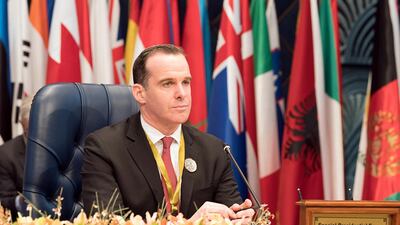Brett McGurk, the former US envoy for the anti-ISIS coalition, who resigned last month because of President Donald Trump's abrupt decision to pull US forces out of Syria, has criticised the US leader for his abrupt withdrawal from Syria and dependence on Turkey as a “reliable partner”.
Mr McGurk, writing in a Washington Post column published on Friday, described a callous and chaotic process behind the controversial decision, one that had given ISIS "new life" in the war-torn country.
He details receiving a call from US Secretary of State Mike Pompeo on December 17, three days after Mr Trump called his Turkish counterpart Recep Tayyip Erdogan and two days before making the decision public.
In that call, while the former envoy was in Iraq, Mr Pompeo “informed us that there had been a sudden change in plans: President Trump, after a phone conversation with his Turkish counterpart, planned to declare victory over the Islamic State and direct our forces to withdraw from Syria,” he wrote.
In his attempt to fix matters with coalition members, Mr McGurk said that he discovered US “counterparts in coalition capitals were bewildered. Our fighting partners in the SDF (Syrian Democratic Forces), whom I had visited regularly on the ground in Syria, expressed shock and then denial.” They hoped that Mr Trump would change his mind, he said.
But that reversal never materialised, leading to Mr McGurk’s exit just days after the resignation of US Secretary of Defence James Mattis. Mr McGurk, who served three US Presidents, said Mr Trump’s decision to leave Syria “was made without deliberation, consultation with allies or Congress, assessment of risk, or appreciation of facts”.
His damning assessment of Mr Trump's Syria policy came a day before US Senator Lindsey Graham called for the president to slow the withdrawal until ISIS is truly defeated, warning that such an abrupt pullout would create an "Iraq on steroids". He pointed to Barack Obama's withdrawal from Iraq in 2011, three years before ISIS overran swathes of territory in the country. "I am urging President Trump not to do what President Obama did, which is just to get out and not to understand what happens when you just get out," he said on Saturday on a visit to Ankara.
Mr McGurk pointed to inaccuracies in Mr Trump's reasoning behind the withdrawal such as declaring the defeat of ISIS in Syria and claiming that Saudi Arabia had “now agreed to spend the necessary money needed to help rebuild Syria”. CNN reported that US military leaders had informed Mr Trump that ISIS was not defeated in Syria; the group carried out its most vicious attack killing four US troops on Wednesday.
_______________
Read more:
US accuses Assad and Russia of staging chemical weapons attack in Aleppo
Warplanes target rebels in Aleppo hours after suspected gas attack
ISIS blast in Syria deepens disagreement over US exit plan
_______________
But worst of all, according to Mr McGurk, is that the US President “made this snap decision after a phone call with [the] Turkish President,” who has long lobbied for a US exit. “He bought Mr Erdogan’s proposal that Turkey take on the fight against the Islamic State deep inside Syria," he wrote.
The former envoy wrote: “Turkey can’t operate hundreds of miles from its border in hostile territory without substantial US military support.” He also called the 20-mile safe zone that Mr Trump has agreed with Mr Erdogan as another seemingly rushed decision “with no process or analysis”.
Mr McGurk criticised Turkey harshly, writing “the Syrian opposition forces it backs are marbled with extremists and number too few to constitute an effective challenge to Assad or a plausible alternative to the SDF”. Idlib, one area where Turkey enjoys influence in Northern Syria, has in recent weeks seen a rise in Al Qaeda (HTS) influence against the more moderate groups.

The former envoy also warned that the more “Turkey expands its reach in Syria, the faster our Arab partners in the region move toward Damascus".
In a damning conclusion, Mr McGurk, who is now a fellow at the Freeman Spogli Institute for International Studies at Stanford University, said Mr Trump’s decisions “are already giving the Islamic State – and other American adversaries – new life”.
Faysal Itani, a scholar who studies Syria at the Atlantic Council, called Mr McGurk’s op-ed “well-argued and is right in outlining that ISIS has not been defeated yet, Assad is staying, and a US withdrawal would bring a great deal of uncertainty and competition to northeast Syria that may undermine the gains against ISIS.” But Mr Itani also singled out problems with Mr McGurk's analysis, beginning with its sympathy to the controversial Kurdish party, the Democratic Union Party (PYD).
"It is not self-evident that the PYD is clearly preferable to all other candidates for controlling this territory, and therefore not self-evident that the US should remain in Syria to ensure its dominance" Mr Itani told The National.
The expert also questioned the former envoy’s “moral outrage over empowering the [Assad] regime given Mr McGurk's previous ambivalence toward the issue” during the Obama days. “It comes off a bit as disingenuous” Mr Itani said.

